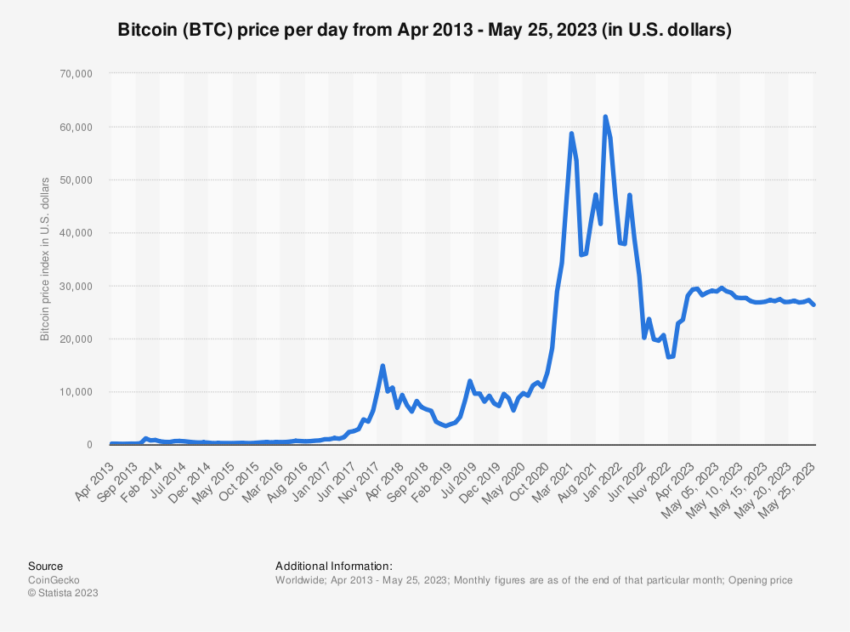
[ad_1]
The winds of change are blowing across the cryptocurrency market, driving a subtle yet transformative shift. Legacy financial institutions are making a foray into the industry. They are capitalizing on the United States Securities and Exchange Commission’s (SEC) regulatory efforts that aim not to ban crypto but mold this sector.
It appears that cryptos, initially touted as a disruptor to traditional finance, are gradually being adopted and shaped by the very firms it sought to challenge.
The World’s Largest Asset Manager Bets Big on Bitcoin
One of the most compelling developments in this context is from BlackRock. As the world’s largest asset manager, the firm boasts an impressive track record of securing SEC approval for its ETFs. Of the 576 ETFs that BlackRock has filed with the SEC, only one has been rejected.
The American multinational investment company recently filed for a spot Bitcoin ETF, named the iShares Bitcoin Trust. Subsequently, setting a new course in crypto ETFs.
In contrast to its predecessors, this venture takes shape under a Delaware statutory trust with a primary design to hold Bitcoin. In a seemingly ironic twist, given its past brushes with the SEC, the Trust selects Coinbase Custody Trust Company as its custodian, fortifying its robustness.

Furthermore, BlackRock has inked a surveillance-sharing agreement with Nasdaq. The goal is to share information about trading, clearing, and customer identification. This maneuver illustrates a thoughtful approach to tackle regulatory hurdles and secure the approval of BlackRock’s application, marking a significant stride in bridging the gap between Wall Street and blockchain.
Interestingly, the role of Coinbase in BlackRock’s application emphasizes the intricate interplay between legacy financial institutions, regulatory bodies, and crypto-native platforms. This relationship underscores a broader trend where conventional financial institutions seamlessly merge with the crypto industry.
Crypto Is Here To Stay – Soros Fund Management CEO
Dawn Fitzpatrick, CEO of Soros Fund Management, echoes this trajectory. In the wake of the SEC’s recent lawsuits against trading platforms Binance and Coinbase, Fitzpatrick perceives a golden opportunity for established financial firms to assume the helm.
“Crypto is here to stay. What has happened is clearly a setback. But right now I actually think it is a huge opportunity for the incumbent financial firms to actually take the lead,” said Fitzpatrick.
As the hit to investor confidence affects crypto-native platforms, traditional institutions, reputable for their commitment to segregating client assets, hold a strong position to instill stability. These actions promise the best of both worlds – cryptocurrency’s innovative aspects and traditional finance’s reliability.
Such a blend can foster a unique synergy, nurturing a more stable and secure cryptocurrency market.
“Especially the headlines of the last couple days, it is clear these crypto native platforms would have benefitted from having an adult in the room. There are just long-held and simple norms about how you treat customer assets,” concluded Fitzpatrick.
Wall Street-Backed Crypto Exchange Prepares to Debut
Similarly, EDX Markets is a crypto exchange backed by established players. These include Charles Schwab, Fidelity Digital Assets, and Citadel Securities, to name a few. Scheduled for a trial run in November, EDX is on a mission to remodel digital markets by assimilating the best features of traditional finance.
As investors become increasingly comfortable with the security provided by broker-dealer services they are familiar with, EDX stands to tap into a latent pool of investors yearning for a secure yet advanced trading platform.
“Many investors are interested in cryptocurrencies but are worried about a potential hack, or other unknowns with existing crypto exchanges. But they are familiar with broker-dealers in other asset classes, and if crypto is offered, they are comfortable trading through them. By separating the responsibility for operating an exchange from those trading on it, conflicts of interest are also eliminated,” said Jamil Nazarali, CEO of EDX Markets.
The emergence of EDX embodies the spirit of harmonizing the efficiency of traditional finance with the flexibility of crypto markets. Consequently consolidating the convergence of these two realms.
“We’re taking some of the best features of traditional finance and bringing it to the digital markets to make it more efficient, and bring that cost saving to investors,” affirmed Nazarali.
These developments underscore a pivotal shift in the US approach towards cryptocurrency. Rather than suppressing crypto, the United States is aligning its efforts to forge a crypto-ecosystem that emulates traditional financial systems’ standards, principles, and efficiency.
America Isn’t Banning Crypto, It’s Helping the Market Mature
The irony is palpable: a sector designed to decentralize and disrupt traditional finance is increasingly being dominated by those it aimed to challenge. This shift, however, is not a hostile takeover. Investors may view this as a natural evolution and a sign of the crypto market’s maturation.
As Fitzpatrick pointed out, these crypto-native platforms could greatly benefit from “having an adult in the room.” That adult increasingly seems to be traditional financial firms. They are expertly steering the crypto ship through the rough regulatory waters toward mainstream acceptance.
The road ahead for crypto holds promise yet remains unpredictable. Nonetheless, the current evolution of the space suggests a gradual convergence with the world of legacy finance. As blockchain technology matures and its applications become more widespread, it will likely integrate more seamlessly with traditional financial systems.
These traditional institutions provide the much-needed stewardship, guiding the crypto sector towards stability, regulatory compliance, and increased trustworthiness.
As such, these firms’ apparent “takeover” should not be viewed with apprehension or with the intent of banning crypto. Instead, one should embrace it as a significant step towards a more robust, regulated, and trustworthy ecosystem. In this ecosystem, the tenets of traditional finance coexist with the revolutionary principles of cryptocurrencies.
The culmination of this evolution might very well be the crypto space’s most powerful disruption yet.
Disclaimer
Following the Trust Project guidelines, this feature article presents opinions and perspectives from industry experts or individuals. BeInCrypto is dedicated to transparent reporting, but the views expressed in this article do not necessarily reflect those of BeInCrypto or its staff. Readers should verify information independently and consult with a professional before making decisions based on this content.
[ad_2]
Source link




